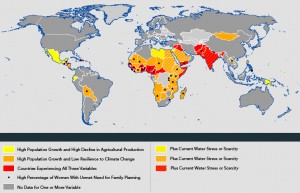Population Pressures: No Quick Fixes, But There are Solutions
Nov 5th, 2014 | By admin | Category: Environment/SustainabilityBy Suzanne York, www.howmany.org
There has been some hoopla over a study published in the Proceedings of the National Academy of Sciences (PNAS) about how decreasing human population numbers is not a quick fix for environmental problems.
Well, of course it’s not a quick fix. Nothing really is, short of a catastrophe. The two authors of the study – Corey A. Bradshaw and Barry W. Brook- write that the “inexorable demographic momentum of the global human population is rapidly eroding Earth’s life-support system,” thus leading to “frequent calls to address environmental problems by advocating further reductions in human fertility.” (Interestingly, the study was edited by Paul R. Ehrlich, author of The Population Bomb.)

Lemurs from Madagascar, a biodiversity hotspot facing enormous human population pressures [photo credit: Treehgr at English Wikipedia]
But could lowering the population help lessen the impacts of climate change and other environmental concerns? The study looked at the question of how long fertility reduction might take to make a meaningful impact.
Bradshaw is the lead author of the report, and he wrote on his blog that “We investigated 10 different scenarios where the fertility and/or survival probabilities changed gradually or in a stepped function, mimicking everything from gradual fertility reductions to all-out catastrophic mortality scenarios (emulating world wars or global pandemics). The take-home message is that even extreme scenarios will not deliver a major reduction in human population size this century. It is a process that will take centuries to occur, rather than decades. Unfortunately, we only have decades to act.”
True, we need to act now. Fortunately, family planning is often considered “low hanging fruit” that can have quick results, and is a relatively small – and needed – investment to make; it is estimated that to meet all the need for family planning services internationally would cost $8 billion a year.
Bob Walker, president of the Population Institute, addressed his concerns with this study. He notes that “Family planning is enormously consequential in developing countries and the benefits do not take long to materialize” and “can have a transformative impact in a generation or less.”
According to Walker, family planning can contribute to the preservation of critical bio-habitats and improve the odds that endangered species will survive. Population is, and will likely remain, a significant environmental factor at the local level.”

Map of population growth and climate impacts. Click to view full size [Map created by Population Action International]
This is just one study, but it has garnered a lot of attention. Voluntary family planning is not going to solve all our problems. The world today is way past the single issue approach to fixing our mess; everything is connected. And despite humanity’s penchant for silver bullets, there isn’t one big one, but there are many existing solutions. Addressing the needs of the 222 million women in the developing world who say they want access to contraceptives is a start. Empowering women and girls with education and sustainable livelihoods is another needed action. And reducing consumption is crucial, but part and parcel of that is rethinking how our economies are structured.
Implementing an integrated approach such as PHE (population, health and environment) is a good way to ease the impact of human beings on the planet. PHE programs address the complex connections between families, their health, and their environment. They emphasize bringing conservation and reproductive health services to communities that both need and want them—particularly those who live outside the reach of any healthcare system, and on the edge of some of the world’s most endangered natural ecosystems. The biodiversity hotspots covered in the PNAS study represent some of the areas with the greatest need for PHE projects (such as Madagascar).
Every person alive today has an impact on the planet, some (Americans especially) have a huge global environmental footprint, while others who are impoverished have much less. But all rely on resources from the Earth to sustain themselves, which affects the environment.
Global society should be investing in family planning and education and empowering people to make the best decisions for themselves and their families and to protect the environment. Ultimately though, we need to have some difficult conversations on maintaining a global economic system predicated on constant growth on a finite planet.
Suzanne York is a senior writer with the Institute for Population Studies.
